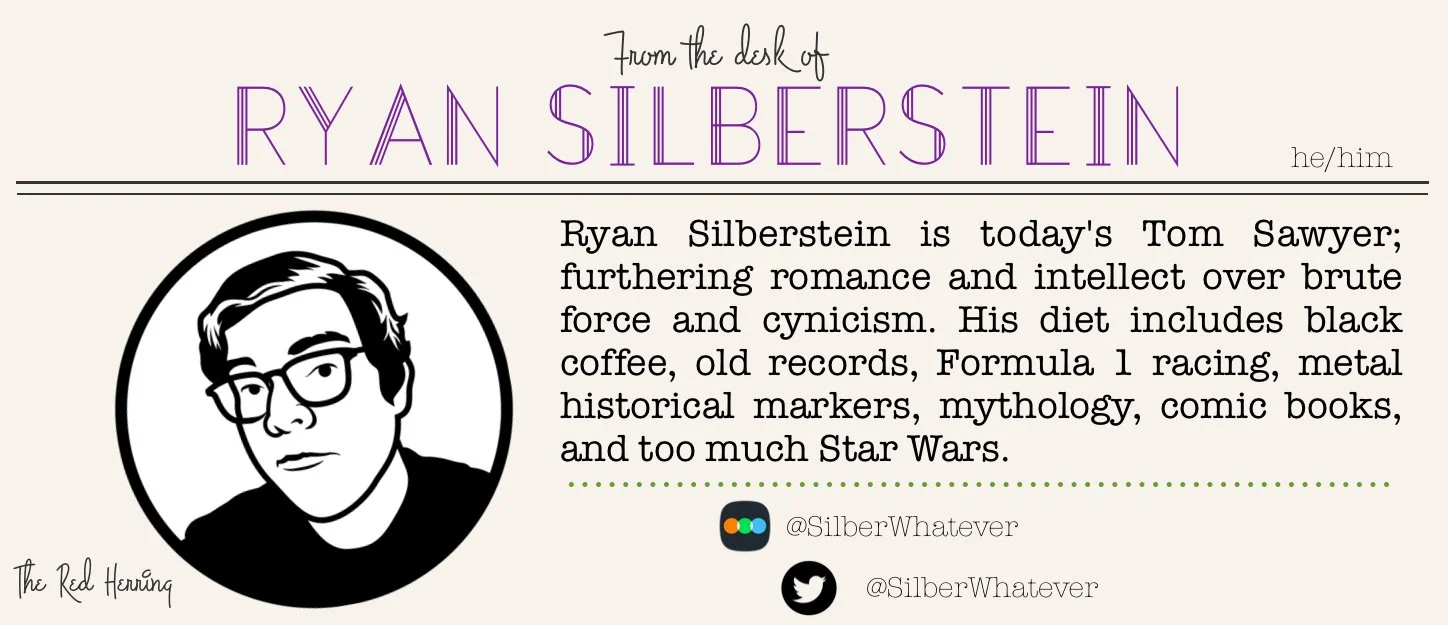Flop and Fizzle #4: All hail David Bowie, the Goblin King of LABYRINTH
For our annual summer countdown, we are looking at our favorite 25 movies that were not huge hits during their initial release, but mean a lot to us. Check out last year’s Summer of Stars countdown or the year before when we did blockbusters! Find the rest of the Flop and Fizzle series here!
by Ryan Silberstein, Managing Editor, Red Herring
Growing up as a fan of The Muppets (especially The Great Muppet Caper and the 90s literary adaptations) spurred me to seek out other works by Jim Henson, namely The Dark Crystal and Labyrinth, whenever they were on television. I admit that neither of these fantasy stories stuck with me as much as Jim Henson’s work with the comedy troupe. Regardless, I rediscovered both when I was in college, and promptly fell in love with them like other 80s fantasy classics of the era I came to later (The Princess Bride, Legend, etc.). But Labyrinth stands out in a few ways for me.
First, I love mazes and labyrinths. So much so that I actually have a tattoo of one on my forearm. While the primary reference for my tattoo is to the story of Theseus and the Minotaur, it also symbolizes the journey both outward and inward. What separates a maze from a labyrinth is that the latter has only one long winding path; the only way through is to keep going. So returning to Labyrinth for this article, I was amused to discover that Sarah’s (Jennifer Connelly) path feels quite linear in this movie. Her arrival at the center of Jareth’s (David Bowie) labyrinth is inevitable. The tension comes not from if she will confront him, but when.
But while her path is ultimately linear in the sense that it feels like the only way she could get through the labyrinth, it doesn’t feel that way to Sarah. The things that feel like diversions or obstacles, especially her eventual companions Hoggle, Ludo, and Sir Didymus, are essential to her navigating her way to Jareth’s castle. This linear path that feels meandering when you’re in the middle of it not only captures the feeling of trying to navigate a labyrinth, but aligns with the metaphorical coming of age that Sarah undergoes in the story. Her entire quest is initiated by her rejection of adult responsibility, specifically her anxieties around motherhood. When her infant stepbrother Toby is crying and possessing her beloved Teddy bear, Lancelot, she wishes him away. The rest of the narrative is informed by fairy tales, Alice in Wonderland, and The Wizard of Oz. By drawing on elemental adolescent feelings and familiar narratives, Labyrinth became a touchstone for an entire generation. Though it was a failure upon its release in 1986, it became a cult hit quickly enough for Jim Henson to learn the final movie he directed was beloved by its fans before his passing in 1990.
While it could be possible to dismiss the story and even some of the creature designs as derivative (personally, I think that is actually part of their power), there is no denying the power and presence of David Bowie. It takes a special kind of performer to act against puppets. I think it might be even more difficult to act in character, on a set full of goblin puppets than it would be to share a scene with Kermit or Miss Piggy. Bowie’s filmography for roles where he is not cameoing or playing himself is quite varied on the surface, but the list of directors he worked with is revealing. Nicolas Roeg, Tony Scott, Martin Scorsese, David Lynch, and Christopher Nolan are the standouts, all of them being storied auteurs with unique visual styles, and I think Jim Henson belongs alongside them.
Bowie’s presence is undeniable, and Jareth is notorious for causing sexual awakenings for the last 37 years. Part of it likely stems from his crystal ball handling–excuse me, “contact juggling”–and the way his costuming emphasizes Bowie’s bulge that feels like it is straining against the PG-rating boundary. But regardless, his magnetic sexuality–even directed toward a teenage girl–is absolutely palpable. This horny Goblin King energy ties back into Sarah’s journey towards womanhood, making it crucial to the functioning of the story. Bowie as Jareth is alluring, threatening, and seems just as comfortable entertaining a court of goblins with his songs as he is trying to sign up Sarah to be his queen. The labyrinth–and Labyrinth itself–revolves around Jareth, and all roads lead to the center, and a choice to accept adulthood or remain in fairyland. Only a rock star actor like Bowie could make that choice feel like a real decision and not a foregone conclusion. All hail the Goblin King!


